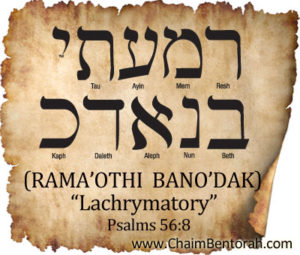HEBREW WORD STUDY – LACHRYMATORY – RAMA’OTHI BANO’DAK עתי בנאדכ
Psalms 56:8: “Thou tellest my wanderings: put thou my tears into thy bottle: [are they] not in thy book?”
 The word for bottle is bn’dk from the root word no’od which was a leather skin that was used as a container. Of course, when we think of a bottle we think of a glass or plastic container. But in David’s time, it was a leather skin
The word for bottle is bn’dk from the root word no’od which was a leather skin that was used as a container. Of course, when we think of a bottle we think of a glass or plastic container. But in David’s time, it was a leather skin
What I find interesting is the Hebrew word used for wanderings is nodi or nod in its root. This is a wordplay of the word no’od bottle. Actually, both words share the same Semitic root ND. Your lexicon will tell you the word nodi means a wanderer or a fugitive. Because of the obvious play on the word for (tears) in a bottle no’od and wanderer nodi, many modern translations will use the intent from the play on words and say “Record my misery or my sorrow.” Why do they see sorrow in the word for wandering – nodi?
You see today we have the English word lachrymatory or a bottle to contain tears. This is still practiced by some but was very common centuries ago. During a funeral, a friend of the deceased would collect the tears of the loved ones with a sponge type cloth and then squeeze the tears into a little bottle or a small leather container and then seal the container to preserve the tears for the loved one as a memorial. Many times this lachrymatory was just a small little pouch or bottle and was worn around the loved one’s neck so that the memory of the beloved would always be present. This little wordplay, really a poetic device, shows us that David is asking God to take the tears he shed and keep them as a memorial. Not just put them in a book where they will be forgotten but for God to wear his tears around his neck as a memorial.
The word nod or wandering in its Semitic root means a shaking or agitation. A later meaning of wander developed as one who is agitated when wandering. Thus you have the idea of grief and sorrow nicely packaged in the two words nod and no’od.
A lachrymatory was usually worn by the surviving spouse as a neckless with the lachrymatory or tear bottle containing the tears of the many who wept over the passing of the loved one. Here, I believe this wordplay is telling us that David recognized his misery was the result of his close relationship with God and his tears were over something that stemmed from his relationship with God. So David wanted his agitations to be memorialized as a lachrymatory, a memorial to the tears that resulted from that relationship. Other tears over the things of this world can be recorded in His book, but these tears are special, they are a record of our relationship with God.
Have you ever wept or experienced sorrow because of your relationship with God? When I was in the ministry there was a young woman in my congregation who was engaged to a young man who was not a believer. After much prayer and consultation, she broke off the engagement. I found her at the altar of our church soon after weeping her heart out to God over her broken heart, broken because she chose her love for God over the love for this young man. Her tears are kept in a lachrymatory around the neck of God and as an assurance that every tear she cried, will be acceptable and justified.







Recent Comments